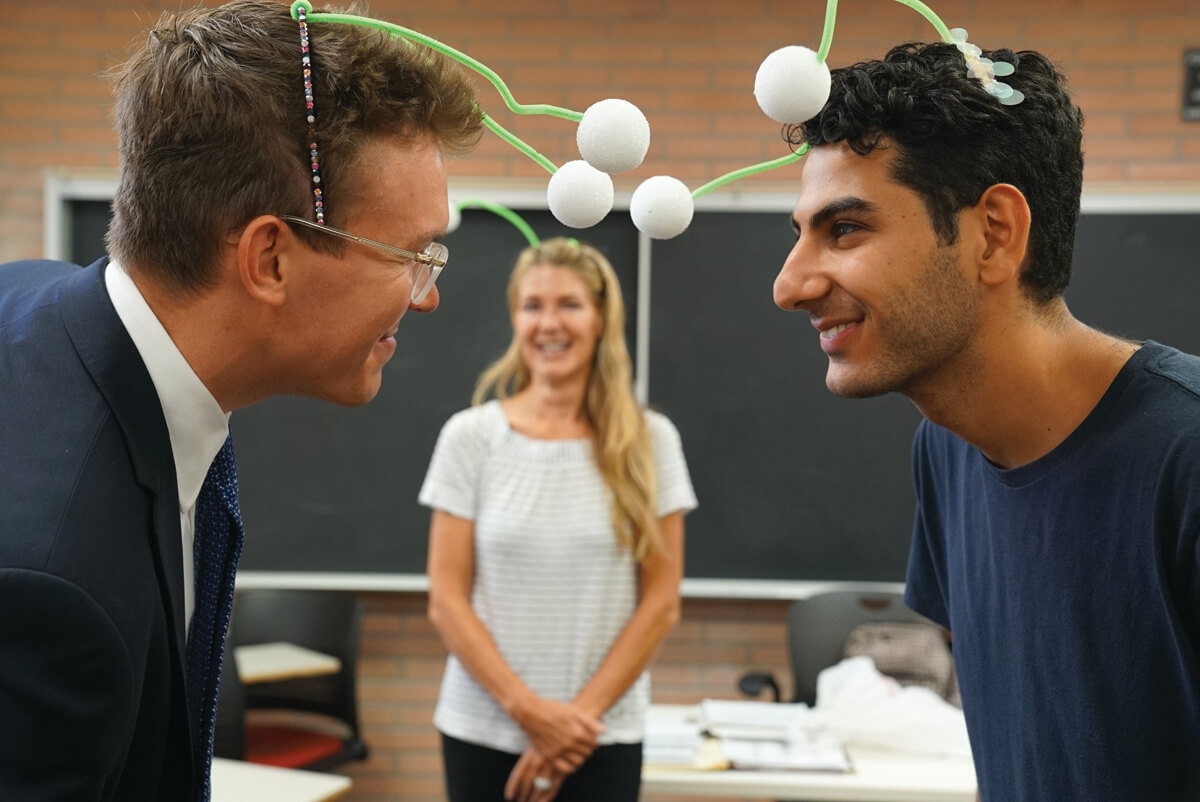“Yes, And…”

The scene: two 20-somethings sit across a small table, gently smiling at one another.
One says: “Hi, I’m Michelle. I’m a junior studying engineering. I love international travel. Have you ever been overseas?”
The other leans forward: “Hi, Michelle! My name is Adam, and I’m a senior at USC. I love to travel. I’ve been to England, France, Italy and China. Seems like we have a lot in common.”
A speed dating event?
No, this meeting took place in a classroom at USC Viterbi, where Elisabeth Arnold Weiss, associate professor of technical communication practice, uses improv in her advanced writing course, Writing 340.
Over the past eight years, scores of USC Viterbi School of Engineering students, as well as non-engineering majors, have learned how to tap into their creative selves by participating in improvisational sessions held every semester in Engineering Writing Program (EWP) classes. In the process, students have “become more confident, more comfortable with extemporaneous tasks and better communicators,” said Weiss, the recent recipient of the USC Viterbi Innovative Teaching Award.
The improv classes, led by instructors from the USC School of Dramatic Arts, have engineering students — typically stereotyped as sober and serious — playing the “Game of Ninja,” in which students stand in a circle, assume a martial arts stance, and try remain the last ninja standing by touching one another’s forearms while preventing classmates from karate chopping theirs, according to Debra De Liso, who has taught USC Viterbi students improv for nearly a decade.
“I want them to dare to be foolish and silly because out of that may come some brilliant idea,” said De Liso, director of over 500 original plays, an actress, and the voice of Raszagal and the Valkyrie Pilot in the popular video game, “StarCraft.”
Improv helps students also become better collaborators, an invaluable skill as engineers increasingly work on interdisciplinary teams that solve big problems, said Martha Jane Townsend, a Writing 340 instructor. In one in-class exercise, students stand in a circle and take turns contributing a sentence or two to a made up story. That “yes, and …” mindset, that openness to new ideas, could pay big dividends for the future engineers.
“When another person has an idea, if our impulse is to say no, then it shuts the conversation down,” Townsend said. “However, if we say, ‘Yes, that’s an interesting idea,’ then we engage in the addition of ideas rather than the silencing of ideas. Simple math suggests that if we say ‘yes, and…’ we are likely to find one or 10 or 500 good ideas, but if we say no, we’ll get zero.”
The improv classes have their roots in a collaboration about a decade ago among “M*A*S*H” actor Alan Alda; K.C. Cole, a professor at the USC Annenberg School for Communication and Journalism and former Los Angeles Times science reporter; and EWP Director Steve Bucher. The trio decided that Alda would coach a group of USC Viterbi students in a variety of techniques used in comedy in the theater.
A year later, Weiss, the EW Pprofessor, took the baton. In 2010, she invited her childhood friend, Mike Henry, to come to her class. Henry, a producer, writer, and the voice of Cleveland Brown on “Family Guy” and co-creator of “The Cleveland Show,” regaled students with stories about the creative process and his Hollywood experiences. When he improvised sketches and characters’ voices, he completely won the class over.
Why not, Weiss thought, make improv a part of the Writing 340 course?
In 2011, Weiss reached out to De Liso, the playwright and improv teacher, to teach her writing classes once a semester. Soon thereafter, the pair began refining material for what would become the Improv for Engineers program. Weiss’s initial improv classes went so well that other professors began adding them to their courses.
As one of the handful of engineering writing programs in the nation to embed improv in the curriculum, USC Viterbi provides students with the opportunity to acquire interpersonal abilities that set them apart from their peers, EWP Director Bucher said.
“The so-called soft skills are incredibly important in developing well-rounded engineers — ones that are more suited to leadership positions and better suited to deal with people from other disciplines,” he said. “I think it’s vital to their development as engineers and innovators.”



